外研版一起六上Modul1-Module5知识点讲解课件(57张)
文档属性
| 名称 | 外研版一起六上Modul1-Module5知识点讲解课件(57张) | 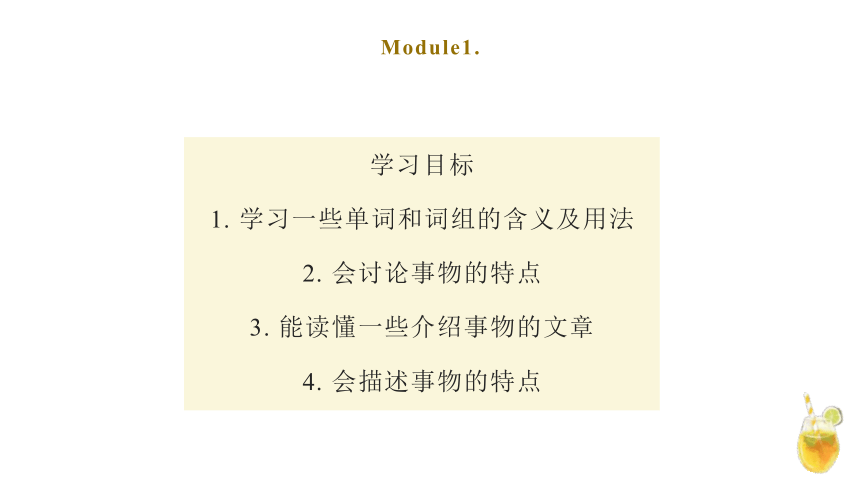 | |
| 格式 | pptx | ||
| 文件大小 | 3.5MB | ||
| 资源类型 | 试卷 | ||
| 版本资源 | 外研版(一年级起点) | ||
| 科目 | 英语 | ||
| 更新时间 | 2021-07-08 17:57:01 | ||
图片预览

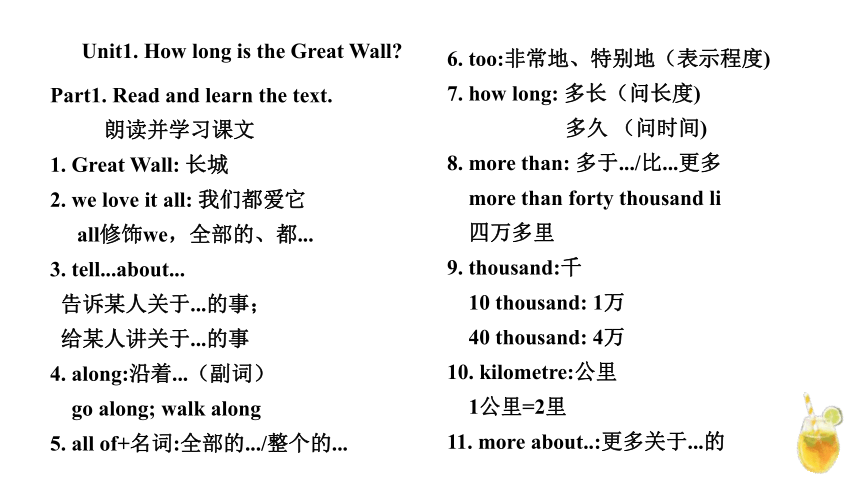
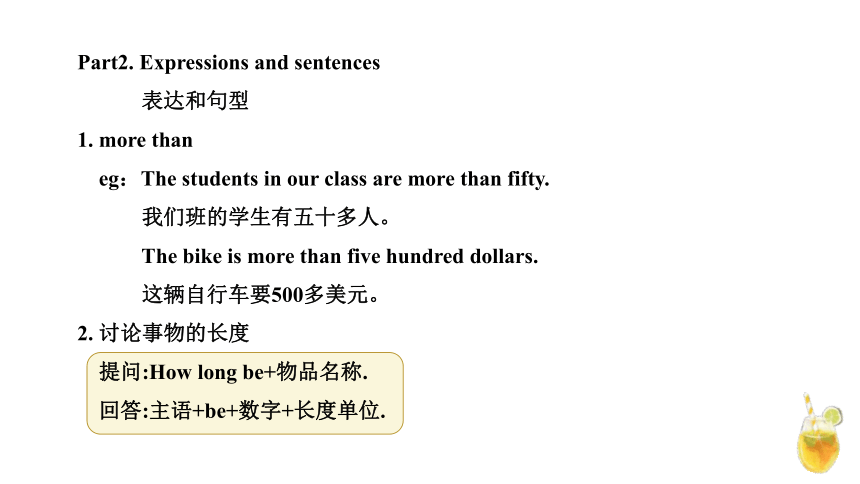
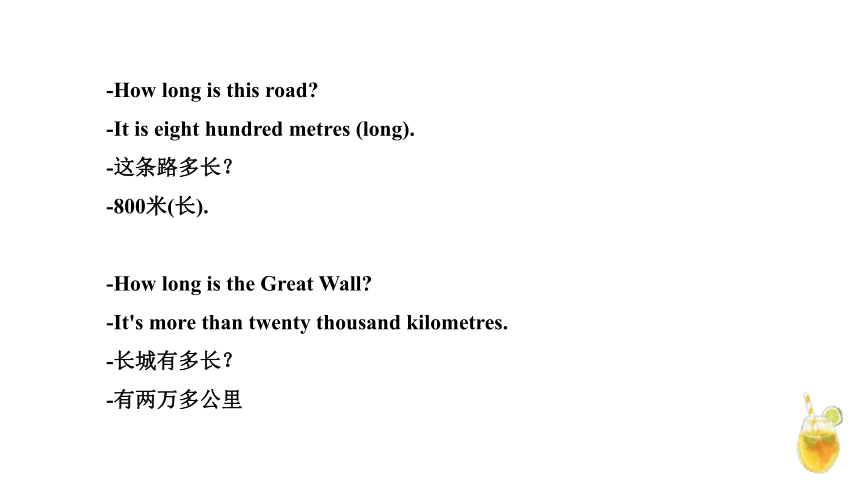
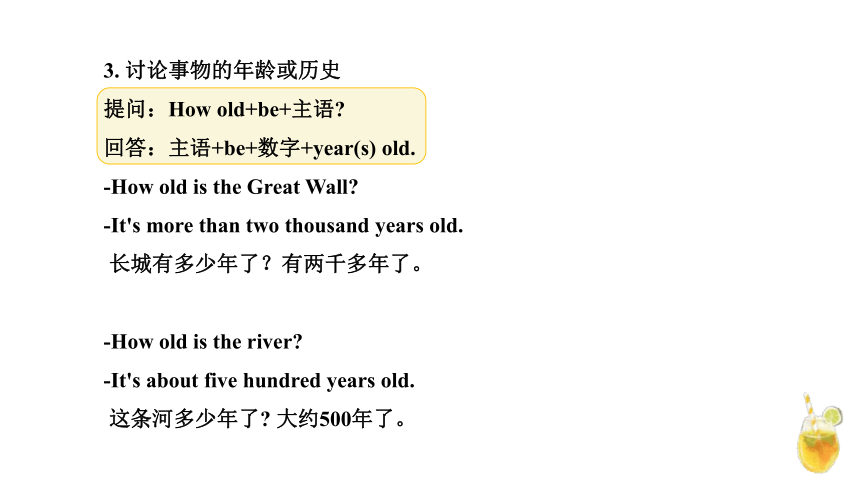
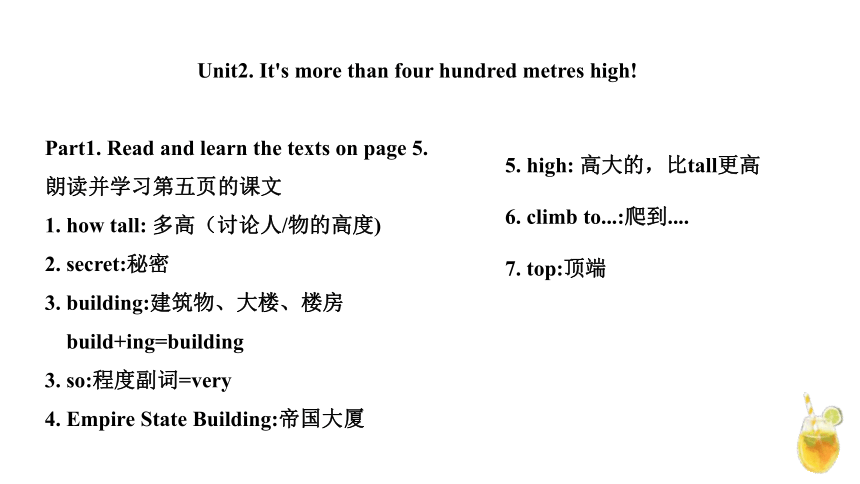
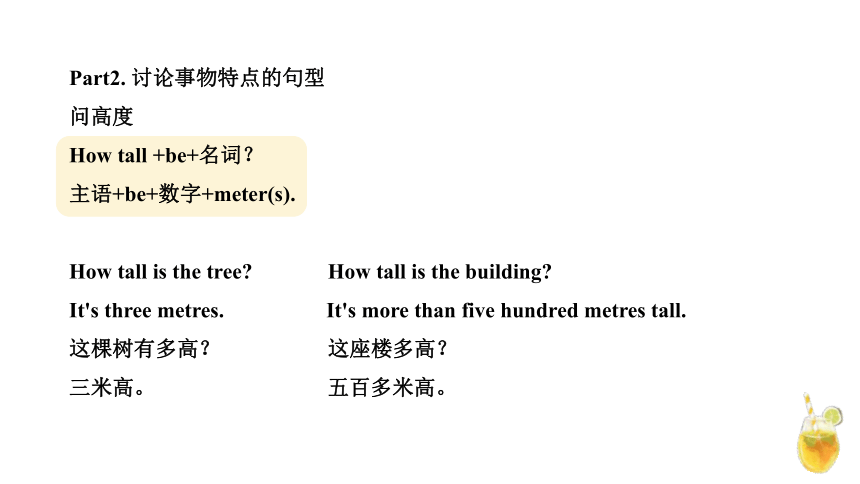
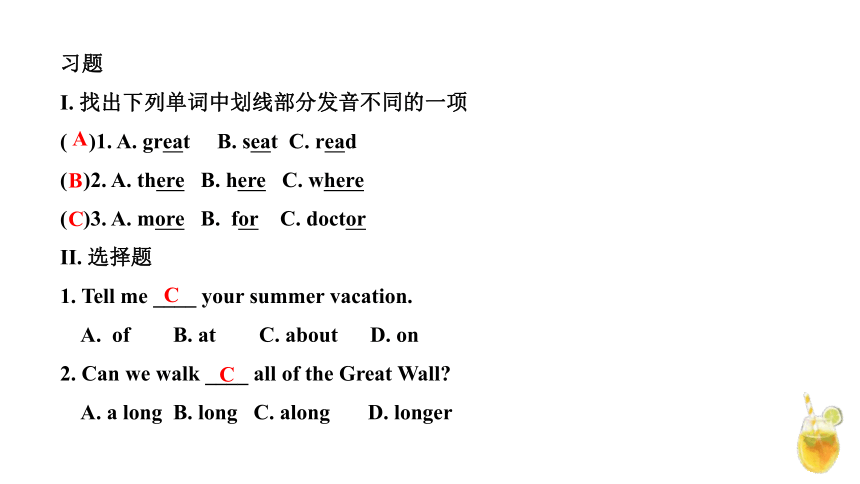
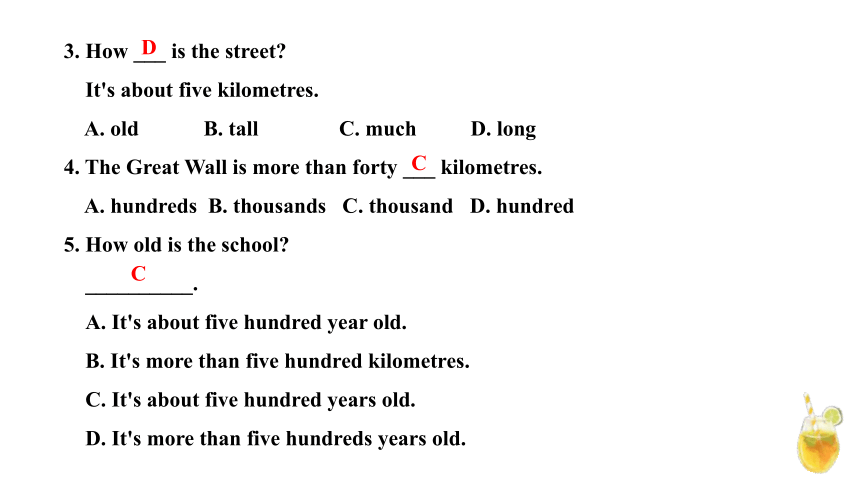
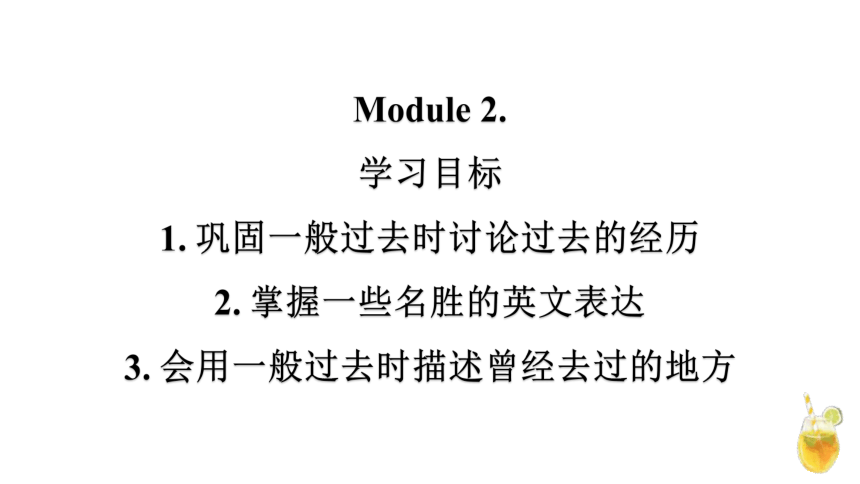

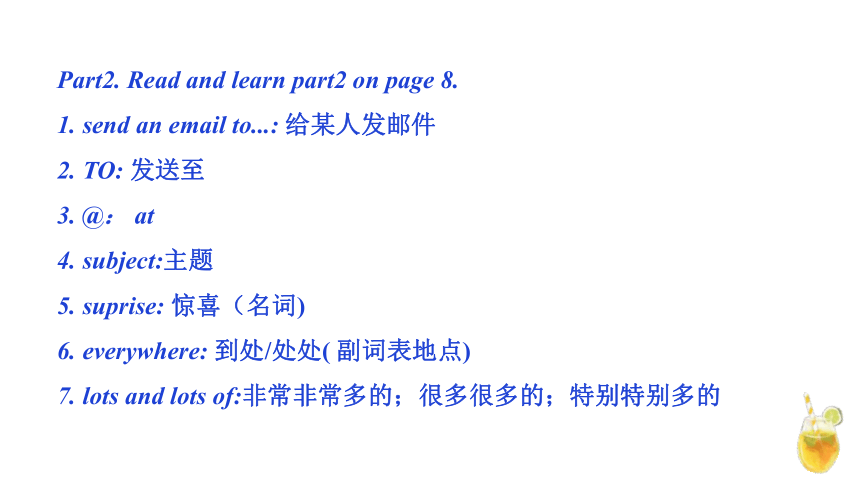
文档简介
Module1.
学习目标
1. 学习一些单词和词组的含义及用法
2. 会讨论事物的特点
3. 能读懂一些介绍事物的文章
4. 会描述事物的特点
Unit1. How long is the Great Wall?
Part1. Read and learn the text.
朗读并学习课文
1. Great Wall: 长城
2. we love it all: 我们都爱它
all修饰we,全部的、都...
3. tell...about...
告诉某人关于...的事;
给某人讲关于...的事
4. along:沿着...(副词)
go along; walk along
5. all of+名词:全部的.../整个的...
6. too:非常地、特别地(表示程度)
7. how long: 多长(问长度)
多久 (问时间)
8. more than: 多于.../比...更多
more than forty thousand li
四万多里
9. thousand:千
10 thousand: 1万
40 thousand: 4万
10. kilometre:公里
1公里=2里
11. more about..:更多关于...的
Part2. Expressions and sentences
表达和句型
1. more than
eg:The students in our class are more than fifty.
我们班的学生有五十多人。
The bike is more than five hundred dollars.
这辆自行车要500多美元。
2. 讨论事物的长度
提问:How long be+物品名称.
回答:主语+be+数字+长度单位.
-How long is this road?
-It is eight hundred metres (long).
-这条路多长?
-800米(长).
-How long is the Great Wall?
-It's more than twenty thousand kilometres.
-长城有多长?
-有两万多公里
3. 讨论事物的年龄或历史
提问:How old+be+主语?
回答:主语+be+数字+year(s) old.
-How old is the Great Wall?
-It's more than two thousand years old.
长城有多少年了?有两千多年了。
-How old is the river?
-It's about five hundred years old.
这条河多少年了? 大约500年了。
Unit2. It's more than four hundred metres high!
Part1. Read and learn the texts on page 5.
朗读并学习第五页的课文
1. how tall: 多高(讨论人/物的高度)
2. secret:秘密
3. building:建筑物、大楼、楼房
build+ing=building
3. so:程度副词=very
4. Empire State Building:帝国大厦
5. high: 高大的,比tall更高
6. climb to...:爬到....
7. top:顶端
Part2. 讨论事物特点的句型
问高度
How tall +be+名词?
主语+be+数字+meter(s).
How tall is the tree? How tall is the building?
It's three metres. It's more than five hundred metres tall.
这棵树有多高? 这座楼多高?
三米高。 五百多米高。
习题
I. 找出下列单词中划线部分发音不同的一项
( )1. A. great B. seat C. read
( )2. A. there B. here C. where
( )3. A. more B. for C. doctor
II. 选择题
1. Tell me ____ your summer vacation.
A. of B. at C. about D. on
2. Can we walk ____ all of the Great Wall?
A. a long B. long C. along D. longer
A
B
C
C
C
3. How ___ is the street?
It's about five kilometres.
A. old B. tall C. much D. long
4. The Great Wall is more than forty ___ kilometres.
A. hundreds B. thousands C. thousand D. hundred
5. How old is the school?
__________.
A. It's about five hundred year old.
B. It's more than five hundred kilometres.
C. It's about five hundred years old.
D. It's more than five hundreds years old.
D
C
C
Module 2.
学习目标
1. 巩固一般过去时讨论过去的经历
2. 掌握一些名胜的英文表达
3. 会用一般过去时描述曾经去过的地方
Unit1. I went to Chinatown in New York yesterday.
Part1. Read and learn part1 on page 8.
1. Chinatown:唐人街/中国街
2. New York:纽约
3. there's/there are: 有、存在
Are there any....+地点?
....有...吗?
(there be句型的一般疑问句)
Part2. Read and learn part2 on page 8.
1. send an email to...: 给某人发邮件
2. TO: 发送至
3. @: at
4. subject:主题
5. suprise: 惊喜(名词)
6. everywhere: 到处/处处( 副词表地点)
7. lots and lots of:非常非常多的;很多很多的;特别特别多的
8. people: 人/人们(复数概念)
9. be different from...: 与...不同
The bus in China is different from Britain.
中国的汽车和英国不同。
This blue dress is different from that one.
这条蓝色的裙子和那条不同。
10. lion dance:舞狮
Part3. 巩固用一般过去时讨论过去的经历
特殊疑问句:特殊疑问词+did+主语+动词原形?
Where did you go? 你去哪儿了?
What did they see? 他们看见什么了?
What did he eat? 他吃什么了?
When did he go there? 他什么时候去那的?
How did you go there? 你们怎么去那的?
Unit2. I went to a library yesterday.
Part1. Read and learn part2 on page 11.
1. Ming Tombs: 明十三陵
tomb: 陵墓;坟墓
2. exciting:令人激动的 (客观环境给他人的感受)
excited: 感到激动的 (个人主观感受)
-ing:令人...的
-ed: 感到...的
3. stone animals: 动物石像 4. gate:大门(户外的铁门等)
5. found:find的过去式
6. favourite: 最喜爱的人/物
7. wrote:write的过去式
8. I want to write a book when I am big.
当我长大后我想写一本书。
Part2. 用一般疑问句讨论是否做过某事
提问:Did+主语+动词原形?
回答: Yes, ...did./ No, ...didn't.
Did you see a friend? Did you find any stone animals?
Yes, I did. No, I didn't.
你见朋友了吗? 你发现动物石像了吗?
我见了。 我没发现。
Module 3.
学习目标
1. 巩固拥有某物的表达
2. 巩固现在进行时讨论正在发生的动作
3. 会讨论爱好
Unit1. Have you got any stamps from China?
Part1. 朗读并学习14页第一部分的课文
1. food:食物(不可数)
2. fish:鱼(表示物种不可数,表示种类可数)
3. from+地点:做定语,表示来自.....的
4. 讨论拥有某物
陈述句:主语+have/has got+物品.
主语+haven't/hasn't got+物品
I have got some food from China.
She has got some Chinese fish.
We haven't got any computer.
He hasn't got a car.
一般疑问句询问他人是否拥有某物
Have/has+主语+名词?
Yes, ...have/has./ No,...haven't/hasn't.
-Have you got any fish from China?
-No, I haven't.
-Has he got any bread?
-Yes, he has.
Part2. 朗读并学习14页第二部分的课文
1. 巩固现在进行时
概念:表示此时此刻正在发生或进行的动作
表示一段时间内持续进行或发生的动作
谓语: be+doing
陈述句: 主语+be+doing(+地点/时间)
be not
一般疑问句: Be+主语+doing?
Yes, ...be./No, ...be not.
特殊疑问句:特殊疑问词+be+主语+doing?
I am putting my new stamps into my stamp book.
我正把我的新邮票放进集邮册里。
Are you playing a new computer game?
你在玩一款新电脑游戏吗?
What are you doing, Sam?
萨姆,你在干什么呢?
Why are you putting your books away?
你为什么要把你的书收起来?
2. stamp: 邮票
3. book:册子
4.These stamps are from Canada.
这些邮票是加拿大的。
5. email:电子邮件
letter:信件(纸质)
6. collect: 收集
collect+可数名词复数:收集...
collect stamps:集邮
collect cards:收集卡片
collect toy cars: 收集玩具汽车
7. Here's+单数名词+for...
Here're +复数名词+for...
这儿有...是给....的。
Here's a new book for him.
这儿有一本新书是给他的。
Here're some stamps for you.
这儿有一些邮票是给你的。
8. You can make a stamp book with them.
你可以用他们做一本集邮册。
with:使用
练习
I. 选出下列单词中不同种类的一项
1. A.fruit B.fish C. vegetable
2. A. juice B. doll C. milk
3. A. went B. collect C. put
II. 用所给单词的正确形式填空
1. What are you __ (do) Sam?
2. These are __ (stamp) from US.
3. Have you __ (get) any fruit?
4. Here __ (be) some Coke for you.
5. I am __(sit) in this big chair.
III.按要求变换句式
1. We have some new pencils.
(用Amy做主语改写句子)
2. Have you got any kites?
(做出否定回答)
3. They are talking about the film.
(改为一般疑问句)
4. She's got a picture.
(改为否定句)
练习
I. 选出下列单词中不同种类的一项
1. A.fruit B.fish C. vegetable
2. A. juice B. doll C. milk
3. A. went B. collect C. put
II. 用所给单词的正确形式填空
1. What are you _doing_ (do) Sam?
2. These are _stamps_ (stamp) from US.
3. Have you _got_ (get) any fruit?
4. Here _is_ (be) some Coke for you.
5. I am _sitting_(sit) in this big chair.
III.按要求变换句式
1. We have some new pencils.
Amy has some new pencils.
2. Have you got any kites?
NO,I haven’t.
3. They are talking about the film.
Are they talking about the film?
4. She's got a picture.
No, she hasn’t.
Unit 2. Collecting stamps is my hobby.
Part1. 朗读并学习17页第一部分课文
1. a picture of...:一张...的照片
名词+of+名词:...的...(名词的所有格)
the sofas of my home我家的沙发
the wings of the birds: 鸟的翅膀
用名词的所有格表示归谁所有的两种方式
(1). 人在前,物在后用's形式
Peter's bag
(2). 物在前,人在后用“名词of名词”的形式
the bag of Peter
Part2. 朗读并学习17页第二部分课文
1. 叙述自己的爱好
动名词+be+my hobby.
....是我的爱好。
Listening music is my hobby.
听音乐是我的爱好。
Swimming is my hobby.
游泳是我的爱好。
Collecting stamps is my hobby.
集邮是我的爱好。
也可说: My hobby is collecting stamps.
2. island: 岛、岛屿
3. Five-Finger Mountain: 五指山
five和finger之间有连字符“-”
故finger一词用单数
4. coconut: 椰子
Part2. 练习
写一篇文章介绍你的爱好,并做详细说明。
Module 4
学习目标
1.学会谈论常见的节日
2. 学会介绍自己最喜爱的节日
3. 学会叙述人们在节日里常做的事
4. 掌握一些单词和词组的含义及表达
Unit1. Thanksgiving is very important in the US
Part1. Read and learn part1 on page 20
1. National Day:国庆节
2. Thanksgiving:感恩节
3. Halloween:万圣节
4. Children's Day:儿童节
介绍某人最喜爱的节日
节日名称 is+形物代/所有格+favourite day.
National Day is his favourite day.
Children's Day is my sister's favourite day.
Part2. Read and learn Part2 on page 20.
1. which: 哪个
2. be important to sb: 对某人来说很重要
important:重要的
3. have a big special dinner: 吃一顿特殊的大餐
4. for:为../因为
We say “thank you” for our food.
我们为我们的食物说“谢谢”.
5. poem:诗歌
a poem about: 关于...的诗歌
6.nearly: 几乎;就要;即将
7. amazing:美妙的
介绍节日
1. 询问节日的日期
-When is+节日名称?
-It's on+日期.
-When is National Day in China?
-It's on the first day of October.
2. 询问人们在节日的活动
-What do people do on +节日名称?
-主语+动词/动词词组.
-What do people do on Thanksgiving?
-We always have a big dinner.
Unit2. Can you tell me about Christmas?
Part1. Read and learn the texts on page 23
1. at Spring Festival: 在春节
2. have the Spring Festival: 过春节
3. tell sb about sth:告诉某人关于...的事/给某人讲...的事
4. on the 25th: on the twenty-fifth 在25号
英语中表示日子的日期要用序数词
fisrt-1st second-2nd third-3rd fourth-4th fifth-5th sixth-6th
seventh-7th eighth-8th nineth-9th tenth=10th eleventh-11th
twelfth-13th
thirteen twenty-first 21st
fourteen thirty-second 32nd
fifteen
sixteen th twentieth thirtieth fortieth fiftieth
seventeen 20th 30th 40th 50th
eighteen (twenty-twenti+eth=twentieth)
nineteen
5. put...in...:把...放进
6. in the streets:在街上
Part2. Learn to describe a festival
学习描述节日
...is a...festival. It it on/in+日期. In/On/At the....festival, we always..... There is/are....in /on/at+地点. People eat/have+食物.
...... I/We love .....
练习
I. 找出下列单词中不同种类的一项
( ) 1. A. one B. fourth C. five D. six
( ) 2. A. nearly B. Chinese C. favourite D. important
( ) 3. A. cards B. countries C. trees D. Christmas
II. 判断所给单词中划线部分的发音是否相同 (Y/N)
1. important for 2. stamp Canada
3. nearly bear 4. subject festival
练习
I. 找出下列单词中不同种类的一项
( B ) 1. A. one B. fourth C. five D. six
( A ) 2. A. nearly B. Chinese C. favourite D. important
( D ) 3. A. cards B. countries C. trees D. Christmas
II. 判断所给单词中划线部分的发音是否相同 (Y/N)
Y 1. important for N 2. stamp Canada
N 3. nearly bear N 4. subject festival
III. 连词成句
1. US, your, is, which, festival, the, in,favourite (?)
2. to, very, is, this, the, US, the, important, us, in, festival (.)
3. in, our, Christmas, put, we, trees, home, many, on (.)
4. have, now, can, the, Spring, we, Festival (?)
III. 连词成句
1. US, your, is, which, festival, the, in,favourite (?)
Which is your favourite festival in US?
2. to, very, is, this, the, US, the, important, us, in, festival (.)
This festival is very important to us in the US.
3. in, our, Christmas, put, we, trees, home, many, on (.)
We put many trees in our home on Christmas.
have, now, can, the, Spring, we, Festival (?)
Can we have the Spring Festival now?
IV. 阅读理解,选择正确的答案。
Mike and Helen are on the phone.
Mike: Hello,this is Mike.Who's that?
Helen: Hello, Mike.This is Helen.Tomorrow is Saturday.
What are you going to do?
Mike: I don't know. How about you?
Helen: Let's go to Chinatown together.
Mike: That sounds like a great idea, but there are often a lot of people
there on Saturday.
Helen: That's right. But there's Chinese dancing tomorrow.
Mike: Wow, that's great! Is there anything else?
Helen: Yes, there is a food festival. Chinese food is delicious.
Mike: Okay. Let's go to Chinatown tomorrow.
Helen: Great! See you tomorrow.
(1) Mike is phoning____
A . his brother B.Helen C . his sister
(2) Today is _____
A .Friday B.Saturday C . Sunday
(3) There are often a lot of people on Saturdays _____
A . in the zoo B . in the park C . in Chinatown
(4) There is_____ in Chinatown tomorrow.
A . a food festival B . Chinese dancing C . both A and B
(5 ) They will go to _____ together.
A . play football B.Chinatown C. see a film
Module 5
学习目标
1. 巩固情态动词can的用法
2. 会介绍他人
3. 会表达自己或他人的需求
4. 能够用所学的内容写一封信
Unit1. Can I write to her?
Part1. Read and learn the text.
1. maybe: 也许,可能,大概=perhaps 6. of course: 当然
2. be from: 来自.... Part2. 巩固情态动词can的用法
I am from China. 我来自中国。 can/can't+动词原形
He is from America. 他来自美国。 1. 表示具备某种能力
We are from the UK. 我们来自英国。 He can speak English.
3. pleased:开心的、高兴的、满意的 他会讲英语。
pleased to do: 乐意做某事/做某事很开心 She can't swim.
pleased with sth/sb: 对...很满意 她不会游泳。
4. pen friend=pen pal: 笔友
5. more about...:更多关于...的
练习:
写一篇短文给你的笔友,谈一谈你自己的基本情况以及你会做的事情,并询问对方的情况,不少于60个词。
2. 表示得到允许可以做某事
You can go home late tonight.
今晚你可以晚回家。
We can't get up that late.
我们不可以起得那么晚。
Can在句首引导一般疑问句时,意思为
“能不能”,“会不会”
Can he speak English?
他会讲英语吗?
Can I go to the cinema on Friday?
周五我可以去看电影吗?
Unit2. I want a Chinese pen friend.
Part1. Read and learn the text.
1. want:想、想要
want sth/sb: 想要某物/某人
want a book:想要一本书
want a pen friend:想要一个朋友
want to do:想做某事
want to buy: 想买
want to see a film: 想看一场电影
3. French:法语、法国人、法国的
France: 法国
4. from+地点: 做定语,来自...的
I want a pen friend from the UK.
我想要一个来自英国的朋友。
5. come from: 来自=be from
I come from London.
Where do you come from?
Do you come from London?
I am from London.
Where are you from?
Are you from London?
6. want to be: 想成为
Part2. Oral practise:口语练习
1. want
我想要一辆自行车。
他想要一个笔友。
你们想要一本新故事书吗?
你的弟弟想要什么?
2. want to do
我想买一支新钢笔。
她想学习钢琴。
3. be from
他来自新疆。
你从哪里来?
你们来自广东吗?
come from
她来自深圳。
彼得从哪里来?
他们来自辽宁吗?
Part4. 写一篇文章介绍你和你的笔友来自何方以及你们想做的事情,不少于60个词。
期中复习
Part1. 句型部分
1. 讨论事物的长度
-How long+be+主语?
-主语+be+数字+长度单位.
-How long is the Great Wall?
-It's more than forty thousand li long.
长城有多长?有四万多里。
2. 讨论事物的年龄
-How old+be+主语?
-主语+be+数字 year(s) old.
-How old is this tree?
-It's about five hundred years old.
这棵树多大年龄了?
大约五百年(岁)了。
4. 会用过去时讨论过去去过何方
Where did you go+时间?
I went to+地点+时间.
-Where did you go yesterday?
-I went to the Ming Tombs yesterday.
5. 用过去时讨论他人过去做的事
What did you do?
I +动词过去式+地点/时间.
What did you see?
I saw+宾语.
What did you eat?
I ate+宾语.
3. 讨论事物的高度
-How tall+be+主语?
-主语+be+数字+长度单位+(tall).
-How tall is the tree?
-It's five metres tall.
这棵树有多高?
五米高。
6. 巩固There be句型的过去式,叙述过
去某地有某物
There was lion dance in China town yesterday.
唐人街昨天有舞狮。
There were lots of stone animals.
有很多动物石像。
7. 用一般疑问句询问他人是否做过某事
Did+主语+动词原形?
Yes,主语+did.
No, 主语+didn't.
8. 会用have got 讨论他人拥有某物
陈述句: 主语+have got/has got+宾语.
I have got some new stamps.
我有一些新邮票。
She has got a new bike.
她有一辆新自行车.
一般疑问句:
Have/Has+主语+got+宾语?
Yes, 主语+have/has.
No, 主语+haven't/hasn't.
Have you got any new stamps?
Yes, I have.
9. 会介绍自己的爱好
Collecting+宾语 is my hobby.
收集...是我的爱好。
=My hobby is collecting+宾语.
Collecting stamps is my hobby.
集邮是我的爱好。
Collecting books is my hobby.
收集图书是我的爱好。
10. 会介绍节日
(1). 描述节日很重要
节日名称 is very important in+国家名称.
Thanksgiving is very important in the US.
The Spring Festival is important in China.
(2). 描述人们在节日里常做的事
主语+always/often+动词词组+地点/时间/方式.
We always have a big special dinner.
People always eat moon cakes at home with their family.
We give presents and send cards.
8. a big surprise: 一个大大的惊喜
9. everywhere=here and there: 到处
10. lots and lots of: 许许多多的
11. be different from: 与...不同
12. lion dance: 舞狮
13. in the street: 在街上
14. Ming Tombs: 明十三陵
15. stone animals: 动物石像
16. from+地点:来自...的/...的
I 've got some stamps from the UK.
我有一些来自英国的邮票。
a picture from the moon: 一张来自月球的照片
Part2. 单词和词组
1.the Great Wall: 长城
2. New York:纽约
3. walk along...:沿着...顺着...
3. more than....: 多于.../比...更多
4. thousand: 千
ten thousand:1万 thirty thousand: 3万
5. metre:米
kilometre:千米/公里
6. climb to the top:爬到顶端
7. Chinatown: 唐人街
17. Five-Finger Mountain: 五指山
18. favourite: 最喜爱的;最喜爱的人/事
19. be important to...: 对...来说很重要
20. say “thank you” for...: 为...说感谢
21. more about...: 更多关于....
22. in the streets: 在街道
23. be from=come from: 来自
Where are you from?
I am from China.
Where do you come from?
I come from China.
24. pleased:开心的、满意的
25. want sb/sth:想要...
I want a pen friend.我想要一个笔友。
I want some apples. 我想要一些苹果。
wan to do: 想做某事
want to write want to speak
26. can: 能/会/可以
I can speak French. 我会讲法语。
Can you swim? 你会游泳吗?
Can I buy some pencils? 我可以买几支铅笔吗?
Can you be my pen friend? 你可以做我的笔友吗?
练习题
I. 找出下列单词中不同种类的一项
( )1. A. office B. school C. metre D. building
( )2. A. town B. spoke C. sun D. island
( )3. A. nearly B. almost C. old D. really
( )4. A. French B. American C. Chinese D. England
II. 判断下列单词中划线的部分发音是(Y)否(N)相同
1. metre December 2. stamp along
3. subject sure 4. nearly bear
5. pleased speak 6. write light
III. 英汉互译
be from 2. pen friend 3. want to be
集邮 5. 来自美国的
6. 动物石像
N
N
N
N
Y
Y
想成为
笔友
来自
collect stamps
be from the USA
stone animals
IV.连词成句
1.it, about, more, can, tell, you, me (?)
Can you tell me more about it?
2. thousand, than, more, is, that, twenty, kilometres (!)
That is more than twenty thousand kilometers!
3. yesterday, went, I, Chinatown, New, in , York, to (.)
I went to Chinatown in New York.
4. big, am, a, write, to, I, I, want, when, book (.)
I want to write a book when I’m big.
5. lights, are, in, and, the, there, shops, the, streets (.)
There are lights in the streets and the shops.
V. 根据短文大意和首字母,用单词的正确形式填空
My f__________ festival is the Spring Festival. The Spring Festival usually c____ in January or February. At the Spring Festival, we a____ have a big m___. It is a big f______ dinner. We eat delicious f_____. We v____ friends and say “Happy New Year” to t____.
avourite
omes
lso
eal
amily
ood
ist
hem
VI.阅读短文,并回答问题。
Miss Su is our teacher. She likes to tell us about her weekends. She usually gets up early on Saturdays. She does exercise in the garden for about half an hour. Then she has her breakfast. She doesn't do housework in the morning. She often plays with her dog for about two hours in the park.The dog runs and jumps happily. She has lunch in a restaurant near her home. She enjoys walking down the street and saying hello to her neighbours. In the afternoon, she cleans her house. She often cooks dinner for herself. Then she watches TV. She enjoys her weekends very much.
1. Who is Miss Su?
___________________________
2. What does she do in the garden?
___________________________
3. Does she do the housework in the morning?
___________________________
4. How long does she play with her dogs in the garden?
___________________________
5. Who does she cook dinner for?
_______________________
She is our teacher.
She does exercise in the garden
No, she doesn’t.
For about two hours.
Herself.
学习目标
1. 学习一些单词和词组的含义及用法
2. 会讨论事物的特点
3. 能读懂一些介绍事物的文章
4. 会描述事物的特点
Unit1. How long is the Great Wall?
Part1. Read and learn the text.
朗读并学习课文
1. Great Wall: 长城
2. we love it all: 我们都爱它
all修饰we,全部的、都...
3. tell...about...
告诉某人关于...的事;
给某人讲关于...的事
4. along:沿着...(副词)
go along; walk along
5. all of+名词:全部的.../整个的...
6. too:非常地、特别地(表示程度)
7. how long: 多长(问长度)
多久 (问时间)
8. more than: 多于.../比...更多
more than forty thousand li
四万多里
9. thousand:千
10 thousand: 1万
40 thousand: 4万
10. kilometre:公里
1公里=2里
11. more about..:更多关于...的
Part2. Expressions and sentences
表达和句型
1. more than
eg:The students in our class are more than fifty.
我们班的学生有五十多人。
The bike is more than five hundred dollars.
这辆自行车要500多美元。
2. 讨论事物的长度
提问:How long be+物品名称.
回答:主语+be+数字+长度单位.
-How long is this road?
-It is eight hundred metres (long).
-这条路多长?
-800米(长).
-How long is the Great Wall?
-It's more than twenty thousand kilometres.
-长城有多长?
-有两万多公里
3. 讨论事物的年龄或历史
提问:How old+be+主语?
回答:主语+be+数字+year(s) old.
-How old is the Great Wall?
-It's more than two thousand years old.
长城有多少年了?有两千多年了。
-How old is the river?
-It's about five hundred years old.
这条河多少年了? 大约500年了。
Unit2. It's more than four hundred metres high!
Part1. Read and learn the texts on page 5.
朗读并学习第五页的课文
1. how tall: 多高(讨论人/物的高度)
2. secret:秘密
3. building:建筑物、大楼、楼房
build+ing=building
3. so:程度副词=very
4. Empire State Building:帝国大厦
5. high: 高大的,比tall更高
6. climb to...:爬到....
7. top:顶端
Part2. 讨论事物特点的句型
问高度
How tall +be+名词?
主语+be+数字+meter(s).
How tall is the tree? How tall is the building?
It's three metres. It's more than five hundred metres tall.
这棵树有多高? 这座楼多高?
三米高。 五百多米高。
习题
I. 找出下列单词中划线部分发音不同的一项
( )1. A. great B. seat C. read
( )2. A. there B. here C. where
( )3. A. more B. for C. doctor
II. 选择题
1. Tell me ____ your summer vacation.
A. of B. at C. about D. on
2. Can we walk ____ all of the Great Wall?
A. a long B. long C. along D. longer
A
B
C
C
C
3. How ___ is the street?
It's about five kilometres.
A. old B. tall C. much D. long
4. The Great Wall is more than forty ___ kilometres.
A. hundreds B. thousands C. thousand D. hundred
5. How old is the school?
__________.
A. It's about five hundred year old.
B. It's more than five hundred kilometres.
C. It's about five hundred years old.
D. It's more than five hundreds years old.
D
C
C
Module 2.
学习目标
1. 巩固一般过去时讨论过去的经历
2. 掌握一些名胜的英文表达
3. 会用一般过去时描述曾经去过的地方
Unit1. I went to Chinatown in New York yesterday.
Part1. Read and learn part1 on page 8.
1. Chinatown:唐人街/中国街
2. New York:纽约
3. there's/there are: 有、存在
Are there any....+地点?
....有...吗?
(there be句型的一般疑问句)
Part2. Read and learn part2 on page 8.
1. send an email to...: 给某人发邮件
2. TO: 发送至
3. @: at
4. subject:主题
5. suprise: 惊喜(名词)
6. everywhere: 到处/处处( 副词表地点)
7. lots and lots of:非常非常多的;很多很多的;特别特别多的
8. people: 人/人们(复数概念)
9. be different from...: 与...不同
The bus in China is different from Britain.
中国的汽车和英国不同。
This blue dress is different from that one.
这条蓝色的裙子和那条不同。
10. lion dance:舞狮
Part3. 巩固用一般过去时讨论过去的经历
特殊疑问句:特殊疑问词+did+主语+动词原形?
Where did you go? 你去哪儿了?
What did they see? 他们看见什么了?
What did he eat? 他吃什么了?
When did he go there? 他什么时候去那的?
How did you go there? 你们怎么去那的?
Unit2. I went to a library yesterday.
Part1. Read and learn part2 on page 11.
1. Ming Tombs: 明十三陵
tomb: 陵墓;坟墓
2. exciting:令人激动的 (客观环境给他人的感受)
excited: 感到激动的 (个人主观感受)
-ing:令人...的
-ed: 感到...的
3. stone animals: 动物石像 4. gate:大门(户外的铁门等)
5. found:find的过去式
6. favourite: 最喜爱的人/物
7. wrote:write的过去式
8. I want to write a book when I am big.
当我长大后我想写一本书。
Part2. 用一般疑问句讨论是否做过某事
提问:Did+主语+动词原形?
回答: Yes, ...did./ No, ...didn't.
Did you see a friend? Did you find any stone animals?
Yes, I did. No, I didn't.
你见朋友了吗? 你发现动物石像了吗?
我见了。 我没发现。
Module 3.
学习目标
1. 巩固拥有某物的表达
2. 巩固现在进行时讨论正在发生的动作
3. 会讨论爱好
Unit1. Have you got any stamps from China?
Part1. 朗读并学习14页第一部分的课文
1. food:食物(不可数)
2. fish:鱼(表示物种不可数,表示种类可数)
3. from+地点:做定语,表示来自.....的
4. 讨论拥有某物
陈述句:主语+have/has got+物品.
主语+haven't/hasn't got+物品
I have got some food from China.
She has got some Chinese fish.
We haven't got any computer.
He hasn't got a car.
一般疑问句询问他人是否拥有某物
Have/has+主语+名词?
Yes, ...have/has./ No,...haven't/hasn't.
-Have you got any fish from China?
-No, I haven't.
-Has he got any bread?
-Yes, he has.
Part2. 朗读并学习14页第二部分的课文
1. 巩固现在进行时
概念:表示此时此刻正在发生或进行的动作
表示一段时间内持续进行或发生的动作
谓语: be+doing
陈述句: 主语+be+doing(+地点/时间)
be not
一般疑问句: Be+主语+doing?
Yes, ...be./No, ...be not.
特殊疑问句:特殊疑问词+be+主语+doing?
I am putting my new stamps into my stamp book.
我正把我的新邮票放进集邮册里。
Are you playing a new computer game?
你在玩一款新电脑游戏吗?
What are you doing, Sam?
萨姆,你在干什么呢?
Why are you putting your books away?
你为什么要把你的书收起来?
2. stamp: 邮票
3. book:册子
4.These stamps are from Canada.
这些邮票是加拿大的。
5. email:电子邮件
letter:信件(纸质)
6. collect: 收集
collect+可数名词复数:收集...
collect stamps:集邮
collect cards:收集卡片
collect toy cars: 收集玩具汽车
7. Here's+单数名词+for...
Here're +复数名词+for...
这儿有...是给....的。
Here's a new book for him.
这儿有一本新书是给他的。
Here're some stamps for you.
这儿有一些邮票是给你的。
8. You can make a stamp book with them.
你可以用他们做一本集邮册。
with:使用
练习
I. 选出下列单词中不同种类的一项
1. A.fruit B.fish C. vegetable
2. A. juice B. doll C. milk
3. A. went B. collect C. put
II. 用所给单词的正确形式填空
1. What are you __ (do) Sam?
2. These are __ (stamp) from US.
3. Have you __ (get) any fruit?
4. Here __ (be) some Coke for you.
5. I am __(sit) in this big chair.
III.按要求变换句式
1. We have some new pencils.
(用Amy做主语改写句子)
2. Have you got any kites?
(做出否定回答)
3. They are talking about the film.
(改为一般疑问句)
4. She's got a picture.
(改为否定句)
练习
I. 选出下列单词中不同种类的一项
1. A.fruit B.fish C. vegetable
2. A. juice B. doll C. milk
3. A. went B. collect C. put
II. 用所给单词的正确形式填空
1. What are you _doing_ (do) Sam?
2. These are _stamps_ (stamp) from US.
3. Have you _got_ (get) any fruit?
4. Here _is_ (be) some Coke for you.
5. I am _sitting_(sit) in this big chair.
III.按要求变换句式
1. We have some new pencils.
Amy has some new pencils.
2. Have you got any kites?
NO,I haven’t.
3. They are talking about the film.
Are they talking about the film?
4. She's got a picture.
No, she hasn’t.
Unit 2. Collecting stamps is my hobby.
Part1. 朗读并学习17页第一部分课文
1. a picture of...:一张...的照片
名词+of+名词:...的...(名词的所有格)
the sofas of my home我家的沙发
the wings of the birds: 鸟的翅膀
用名词的所有格表示归谁所有的两种方式
(1). 人在前,物在后用's形式
Peter's bag
(2). 物在前,人在后用“名词of名词”的形式
the bag of Peter
Part2. 朗读并学习17页第二部分课文
1. 叙述自己的爱好
动名词+be+my hobby.
....是我的爱好。
Listening music is my hobby.
听音乐是我的爱好。
Swimming is my hobby.
游泳是我的爱好。
Collecting stamps is my hobby.
集邮是我的爱好。
也可说: My hobby is collecting stamps.
2. island: 岛、岛屿
3. Five-Finger Mountain: 五指山
five和finger之间有连字符“-”
故finger一词用单数
4. coconut: 椰子
Part2. 练习
写一篇文章介绍你的爱好,并做详细说明。
Module 4
学习目标
1.学会谈论常见的节日
2. 学会介绍自己最喜爱的节日
3. 学会叙述人们在节日里常做的事
4. 掌握一些单词和词组的含义及表达
Unit1. Thanksgiving is very important in the US
Part1. Read and learn part1 on page 20
1. National Day:国庆节
2. Thanksgiving:感恩节
3. Halloween:万圣节
4. Children's Day:儿童节
介绍某人最喜爱的节日
节日名称 is+形物代/所有格+favourite day.
National Day is his favourite day.
Children's Day is my sister's favourite day.
Part2. Read and learn Part2 on page 20.
1. which: 哪个
2. be important to sb: 对某人来说很重要
important:重要的
3. have a big special dinner: 吃一顿特殊的大餐
4. for:为../因为
We say “thank you” for our food.
我们为我们的食物说“谢谢”.
5. poem:诗歌
a poem about: 关于...的诗歌
6.nearly: 几乎;就要;即将
7. amazing:美妙的
介绍节日
1. 询问节日的日期
-When is+节日名称?
-It's on+日期.
-When is National Day in China?
-It's on the first day of October.
2. 询问人们在节日的活动
-What do people do on +节日名称?
-主语+动词/动词词组.
-What do people do on Thanksgiving?
-We always have a big dinner.
Unit2. Can you tell me about Christmas?
Part1. Read and learn the texts on page 23
1. at Spring Festival: 在春节
2. have the Spring Festival: 过春节
3. tell sb about sth:告诉某人关于...的事/给某人讲...的事
4. on the 25th: on the twenty-fifth 在25号
英语中表示日子的日期要用序数词
fisrt-1st second-2nd third-3rd fourth-4th fifth-5th sixth-6th
seventh-7th eighth-8th nineth-9th tenth=10th eleventh-11th
twelfth-13th
thirteen twenty-first 21st
fourteen thirty-second 32nd
fifteen
sixteen th twentieth thirtieth fortieth fiftieth
seventeen 20th 30th 40th 50th
eighteen (twenty-twenti+eth=twentieth)
nineteen
5. put...in...:把...放进
6. in the streets:在街上
Part2. Learn to describe a festival
学习描述节日
...is a...festival. It it on/in+日期. In/On/At the....festival, we always..... There is/are....in /on/at+地点. People eat/have+食物.
...... I/We love .....
练习
I. 找出下列单词中不同种类的一项
( ) 1. A. one B. fourth C. five D. six
( ) 2. A. nearly B. Chinese C. favourite D. important
( ) 3. A. cards B. countries C. trees D. Christmas
II. 判断所给单词中划线部分的发音是否相同 (Y/N)
1. important for 2. stamp Canada
3. nearly bear 4. subject festival
练习
I. 找出下列单词中不同种类的一项
( B ) 1. A. one B. fourth C. five D. six
( A ) 2. A. nearly B. Chinese C. favourite D. important
( D ) 3. A. cards B. countries C. trees D. Christmas
II. 判断所给单词中划线部分的发音是否相同 (Y/N)
Y 1. important for N 2. stamp Canada
N 3. nearly bear N 4. subject festival
III. 连词成句
1. US, your, is, which, festival, the, in,favourite (?)
2. to, very, is, this, the, US, the, important, us, in, festival (.)
3. in, our, Christmas, put, we, trees, home, many, on (.)
4. have, now, can, the, Spring, we, Festival (?)
III. 连词成句
1. US, your, is, which, festival, the, in,favourite (?)
Which is your favourite festival in US?
2. to, very, is, this, the, US, the, important, us, in, festival (.)
This festival is very important to us in the US.
3. in, our, Christmas, put, we, trees, home, many, on (.)
We put many trees in our home on Christmas.
have, now, can, the, Spring, we, Festival (?)
Can we have the Spring Festival now?
IV. 阅读理解,选择正确的答案。
Mike and Helen are on the phone.
Mike: Hello,this is Mike.Who's that?
Helen: Hello, Mike.This is Helen.Tomorrow is Saturday.
What are you going to do?
Mike: I don't know. How about you?
Helen: Let's go to Chinatown together.
Mike: That sounds like a great idea, but there are often a lot of people
there on Saturday.
Helen: That's right. But there's Chinese dancing tomorrow.
Mike: Wow, that's great! Is there anything else?
Helen: Yes, there is a food festival. Chinese food is delicious.
Mike: Okay. Let's go to Chinatown tomorrow.
Helen: Great! See you tomorrow.
(1) Mike is phoning____
A . his brother B.Helen C . his sister
(2) Today is _____
A .Friday B.Saturday C . Sunday
(3) There are often a lot of people on Saturdays _____
A . in the zoo B . in the park C . in Chinatown
(4) There is_____ in Chinatown tomorrow.
A . a food festival B . Chinese dancing C . both A and B
(5 ) They will go to _____ together.
A . play football B.Chinatown C. see a film
Module 5
学习目标
1. 巩固情态动词can的用法
2. 会介绍他人
3. 会表达自己或他人的需求
4. 能够用所学的内容写一封信
Unit1. Can I write to her?
Part1. Read and learn the text.
1. maybe: 也许,可能,大概=perhaps 6. of course: 当然
2. be from: 来自.... Part2. 巩固情态动词can的用法
I am from China. 我来自中国。 can/can't+动词原形
He is from America. 他来自美国。 1. 表示具备某种能力
We are from the UK. 我们来自英国。 He can speak English.
3. pleased:开心的、高兴的、满意的 他会讲英语。
pleased to do: 乐意做某事/做某事很开心 She can't swim.
pleased with sth/sb: 对...很满意 她不会游泳。
4. pen friend=pen pal: 笔友
5. more about...:更多关于...的
练习:
写一篇短文给你的笔友,谈一谈你自己的基本情况以及你会做的事情,并询问对方的情况,不少于60个词。
2. 表示得到允许可以做某事
You can go home late tonight.
今晚你可以晚回家。
We can't get up that late.
我们不可以起得那么晚。
Can在句首引导一般疑问句时,意思为
“能不能”,“会不会”
Can he speak English?
他会讲英语吗?
Can I go to the cinema on Friday?
周五我可以去看电影吗?
Unit2. I want a Chinese pen friend.
Part1. Read and learn the text.
1. want:想、想要
want sth/sb: 想要某物/某人
want a book:想要一本书
want a pen friend:想要一个朋友
want to do:想做某事
want to buy: 想买
want to see a film: 想看一场电影
3. French:法语、法国人、法国的
France: 法国
4. from+地点: 做定语,来自...的
I want a pen friend from the UK.
我想要一个来自英国的朋友。
5. come from: 来自=be from
I come from London.
Where do you come from?
Do you come from London?
I am from London.
Where are you from?
Are you from London?
6. want to be: 想成为
Part2. Oral practise:口语练习
1. want
我想要一辆自行车。
他想要一个笔友。
你们想要一本新故事书吗?
你的弟弟想要什么?
2. want to do
我想买一支新钢笔。
她想学习钢琴。
3. be from
他来自新疆。
你从哪里来?
你们来自广东吗?
come from
她来自深圳。
彼得从哪里来?
他们来自辽宁吗?
Part4. 写一篇文章介绍你和你的笔友来自何方以及你们想做的事情,不少于60个词。
期中复习
Part1. 句型部分
1. 讨论事物的长度
-How long+be+主语?
-主语+be+数字+长度单位.
-How long is the Great Wall?
-It's more than forty thousand li long.
长城有多长?有四万多里。
2. 讨论事物的年龄
-How old+be+主语?
-主语+be+数字 year(s) old.
-How old is this tree?
-It's about five hundred years old.
这棵树多大年龄了?
大约五百年(岁)了。
4. 会用过去时讨论过去去过何方
Where did you go+时间?
I went to+地点+时间.
-Where did you go yesterday?
-I went to the Ming Tombs yesterday.
5. 用过去时讨论他人过去做的事
What did you do?
I +动词过去式+地点/时间.
What did you see?
I saw+宾语.
What did you eat?
I ate+宾语.
3. 讨论事物的高度
-How tall+be+主语?
-主语+be+数字+长度单位+(tall).
-How tall is the tree?
-It's five metres tall.
这棵树有多高?
五米高。
6. 巩固There be句型的过去式,叙述过
去某地有某物
There was lion dance in China town yesterday.
唐人街昨天有舞狮。
There were lots of stone animals.
有很多动物石像。
7. 用一般疑问句询问他人是否做过某事
Did+主语+动词原形?
Yes,主语+did.
No, 主语+didn't.
8. 会用have got 讨论他人拥有某物
陈述句: 主语+have got/has got+宾语.
I have got some new stamps.
我有一些新邮票。
She has got a new bike.
她有一辆新自行车.
一般疑问句:
Have/Has+主语+got+宾语?
Yes, 主语+have/has.
No, 主语+haven't/hasn't.
Have you got any new stamps?
Yes, I have.
9. 会介绍自己的爱好
Collecting+宾语 is my hobby.
收集...是我的爱好。
=My hobby is collecting+宾语.
Collecting stamps is my hobby.
集邮是我的爱好。
Collecting books is my hobby.
收集图书是我的爱好。
10. 会介绍节日
(1). 描述节日很重要
节日名称 is very important in+国家名称.
Thanksgiving is very important in the US.
The Spring Festival is important in China.
(2). 描述人们在节日里常做的事
主语+always/often+动词词组+地点/时间/方式.
We always have a big special dinner.
People always eat moon cakes at home with their family.
We give presents and send cards.
8. a big surprise: 一个大大的惊喜
9. everywhere=here and there: 到处
10. lots and lots of: 许许多多的
11. be different from: 与...不同
12. lion dance: 舞狮
13. in the street: 在街上
14. Ming Tombs: 明十三陵
15. stone animals: 动物石像
16. from+地点:来自...的/...的
I 've got some stamps from the UK.
我有一些来自英国的邮票。
a picture from the moon: 一张来自月球的照片
Part2. 单词和词组
1.the Great Wall: 长城
2. New York:纽约
3. walk along...:沿着...顺着...
3. more than....: 多于.../比...更多
4. thousand: 千
ten thousand:1万 thirty thousand: 3万
5. metre:米
kilometre:千米/公里
6. climb to the top:爬到顶端
7. Chinatown: 唐人街
17. Five-Finger Mountain: 五指山
18. favourite: 最喜爱的;最喜爱的人/事
19. be important to...: 对...来说很重要
20. say “thank you” for...: 为...说感谢
21. more about...: 更多关于....
22. in the streets: 在街道
23. be from=come from: 来自
Where are you from?
I am from China.
Where do you come from?
I come from China.
24. pleased:开心的、满意的
25. want sb/sth:想要...
I want a pen friend.我想要一个笔友。
I want some apples. 我想要一些苹果。
wan to do: 想做某事
want to write want to speak
26. can: 能/会/可以
I can speak French. 我会讲法语。
Can you swim? 你会游泳吗?
Can I buy some pencils? 我可以买几支铅笔吗?
Can you be my pen friend? 你可以做我的笔友吗?
练习题
I. 找出下列单词中不同种类的一项
( )1. A. office B. school C. metre D. building
( )2. A. town B. spoke C. sun D. island
( )3. A. nearly B. almost C. old D. really
( )4. A. French B. American C. Chinese D. England
II. 判断下列单词中划线的部分发音是(Y)否(N)相同
1. metre December 2. stamp along
3. subject sure 4. nearly bear
5. pleased speak 6. write light
III. 英汉互译
be from 2. pen friend 3. want to be
集邮 5. 来自美国的
6. 动物石像
N
N
N
N
Y
Y
想成为
笔友
来自
collect stamps
be from the USA
stone animals
IV.连词成句
1.it, about, more, can, tell, you, me (?)
Can you tell me more about it?
2. thousand, than, more, is, that, twenty, kilometres (!)
That is more than twenty thousand kilometers!
3. yesterday, went, I, Chinatown, New, in , York, to (.)
I went to Chinatown in New York.
4. big, am, a, write, to, I, I, want, when, book (.)
I want to write a book when I’m big.
5. lights, are, in, and, the, there, shops, the, streets (.)
There are lights in the streets and the shops.
V. 根据短文大意和首字母,用单词的正确形式填空
My f__________ festival is the Spring Festival. The Spring Festival usually c____ in January or February. At the Spring Festival, we a____ have a big m___. It is a big f______ dinner. We eat delicious f_____. We v____ friends and say “Happy New Year” to t____.
avourite
omes
lso
eal
amily
ood
ist
hem
VI.阅读短文,并回答问题。
Miss Su is our teacher. She likes to tell us about her weekends. She usually gets up early on Saturdays. She does exercise in the garden for about half an hour. Then she has her breakfast. She doesn't do housework in the morning. She often plays with her dog for about two hours in the park.The dog runs and jumps happily. She has lunch in a restaurant near her home. She enjoys walking down the street and saying hello to her neighbours. In the afternoon, she cleans her house. She often cooks dinner for herself. Then she watches TV. She enjoys her weekends very much.
1. Who is Miss Su?
___________________________
2. What does she do in the garden?
___________________________
3. Does she do the housework in the morning?
___________________________
4. How long does she play with her dogs in the garden?
___________________________
5. Who does she cook dinner for?
_______________________
She is our teacher.
She does exercise in the garden
No, she doesn’t.
For about two hours.
Herself.
同课章节目录
- Module 1
- Unit 1 How long is the Great Wall?
- Unit 2 It's more than four hundred metres high!
- Module 2
- Unit 1 I went to Chinatown in New York yesterday.
- Unit 2 I went to a library yesterday.
- Module 3
- Unit 1 Have you got any stamps from China?
- Unit 2 Collecting stamps is my hobby.
- Module 4
- Unit 1 Thanksgiving is very important in the US.
- Unit 2 Can you tell me aboutChristmas??
- Module 5
- Unit 1 Can I write to her?
- Unit 2 I want a Chinese pen friend.
- Module 6
- Unit 1 I've got some Chinese chopsticks.
- Unit 2 I haven't got a book aboutthe US.
- Module 7
- Unit 1 Pandas love bamboo.
- Unit 2 A child sleeps for eight hours a night.
- Module 8
- Unit 1 Do you often tidy your bed?
- Unit 2 I often read English books.
- Module 9
- Unit 1 Do you want to visit the UN building?
- Unit 2 I want to go to Shanghai.
- Module 10
- Unit 1 Only drink clean water!
- Unit 2 Go straight on.
- Review Module
- Unit 1
- Unit 2
